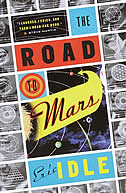Eric Idle, The Road to Mars
reviewed by Michael J A Tyzuk

|
|
The Road to Mars Author: Eric Idle Publisher: Vintage Paperback Length: 320 pp. ISBN: 0375703128 Price: $20 Cdn |
There are some books which should be read just on general principle. You know them when you see them. You walk past them in the book store and the covers just seem to reach out and grab you. The description on the back of the book hooks you and reels you in and the next thing you know you’re walking up to the counter with the thing in your hand. Sometimes you don’t even get to the sales pitch on the back, you see the name of the author and scoop the thing up because if this bloke’s writing it then it must be good.
That’s what happened to me when I was taking a cruise through my local Chapters and saw The Road to Mars, by Eric Idle.
For the unwashed among you, a little background. Eric Idle was, and still is, let’s face it, one of the members of Monty Python. He was responsible for a lot of the bizarre, cheeky, sometimes witty things that the lads did on screen. The Nudge Nudge sketch was one of his. So was the one about the fellow who had just gotten married the weekend before and wanted to trade his wife in on a newer model because the other one wasn’t any good. Eric was also the one responsible for writing a lot of the songs that the Python boys performed. One of his most memorable musical creations is “Always Look On The Bright Side of Life,” which was performed as a song and dance routine while the performers were being crucified at the end of The Life of Brian.
The bottom line is that Eric is a very funny man and I am willing to grab any book that has his name in the byline sight unseen because I trust him to deliver something that is very intelligent, very witty, and very funny. In the immortal words of Steve Martin, “I laughed, I cried, and then I read the book.”
The Road to Mars chronicles the adventures of Muscroft and Ashby, a pair of future Vaudeville comedians, and their trusty android, Carlton, who bears a striking resemblance to David Bowie (not the androgynous Ziggy Stardust era Bowie but the full-blown, golden-haired young white God look Bowie). Muscroft and Ashby are working their way through the Sol System vaudeville circuit and Carlton is attempting to write a thesis that defines comedy.
While Muscroft and Ashby are working their way from one catastrophe to another we also get to see, in great detail, the gradual mental and emotional collapse of Professor William Reynolds, the far future scholar who is devoting his entire life to piecing together Carlton’s thesis for the historical (and somewhat hysterical) record. The farther we get through the book the more pronounced the professor’s dementia becomes, until finally his girlfriend leaves him and he reaches the point where he has to decide whether or not his life has any real meaning anymore.
In other words, it’s exactly the kind of story that would fit right in at Bewildering Stories and I’m somewhat jealous that I didn’t think of it first, dammit.
What’s really interesting about the book is the way it explores the premise that most comedians are really socially disturbed individuals, and therefore the people who study comedians and who study why comedy is funny are just as disturbed as the comedians themselves. What happens to Professor Reynolds is a perfect example of this. But the book also shows us that despite their handicap, most comedians are probably pretty kind and decent individuals at heart, and really want nothing more than to be able to go through life doing what they want to do and saying what they want to do. The problem is that by doing what they want to do and saying what they want to say they become famous, and fame is a drug that is just as addictive as cocaine, in its own way.
It’s a very lighthearted tale, very much intended to entertain. It’s also extremely well written, and if you sit down and pay attention to what you’re reading you might even start to hear Eric’s voice in your head as you progress through the book. That’s what happened to me when I read the passages about the equation that Carlton wrote to describe the truism that comedy is what happens to other people.
Fair warning: If you’re going to read this book then you have to make sure that you have your sense of humor with you. If you don’t then you won’t get the most out of this book, and that would be a shame. The book has a lot to give, but it needs that gateway into your brain and your heart. You might not fall off your couch through laughing so hard like I did, but I promise that you will at least chuckle, and isn’t that a good thing? Who says that speculative fiction can’t have a lighter side? Eric certainly doesn’t seem to think so.

